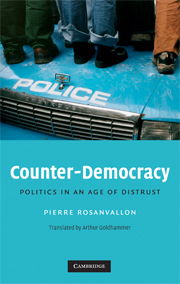Part 2 - The sovereignty of prevention
Published online by Cambridge University Press: 24 May 2010
Summary
“The faculty to decide is what I call the right to issue orders in one's own name or to correct orders issued in someone else's name. The faculty to prevent is what I call the right to nullify a resolution taken by someone else.” This distinction of Montesquieu's is essential if we are to understand recent political developments. It calls attention to a seldom analyzed negative dimension of politics whose importance is clearly growing. Preventive action has come into its own lately as a second type of counter-democratic political intervention. There is a long history to this negative aspect of the political. Long before ordinary citizens laid claim to a share of sovereignty, they had already demonstrated their ability to resist the powers-that-be. Through passive resistance, tactical withdrawal, or clever circumvention of rules, they endeavored to loosen power's grip. Descriptions of this type of behavior and its consequences are common. Tax resistance has been treated in numerous studies, for instance. But there have also been more direct confrontations of political authority. The history of humankind is punctuated by rebellions, riots, and other spontaneous uprisings, and the idea that there is a legal and moral “right to resist” was formulated long before anyone conceived of the right to vote. Popular intervention was thus envisioned initially in negative terms; indeed, the absence of resistance was taken as proof of the people's consent.
- Type
- Chapter
- Information
- Counter-DemocracyPolitics in an Age of Distrust, pp. 121 - 124Publisher: Cambridge University PressPrint publication year: 2008

